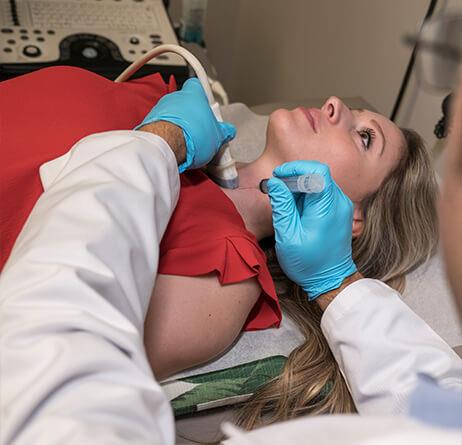Colloid goiter: Symptoms, diagnosis and treatment

Nodular goiter is a disease of the endocrine gland of the thyroid gland. There are several types of nodular goiter, including solid nodules or liquid nodules. In particular, when the goiter contains a liquid nucleus - also known as colloid goiter, it is a thick fluid that can contain many different components. So, what is colloid goiter? SignsSymptomsList will explain more clearly through the following article.
content
- What is a colloid goiter?
- Symptoms of colloid goiter
- Ways to diagnose
- Is colloid goiter dangerous?
- Who are susceptible to colloid goiter?
- How is colloid goiter treated?
What is a colloid goiter?
Colloid goiter is a fluid-filled mass in thyroid tissue. The masses vary greatly in size from small masses to large masses – also called cysts. In the thyroid gland, there may be one or more colloid goiters or solid nodules in the gland. These cases are usually diagnosed as mixed nodular goiter. This pathology is often complex and should be examined by an endocrinologist.
Symptoms of colloid goiter
Most people with the disease often have no symptoms, patients know they have the disease through periodic health screenings.
However, a small number of patients may have thyroid symptoms such as:
1. Symptoms due to complications of colloid goiter
Often patients will feel neck pain due to bleeding in the tissue or lack of blood supply to the thyroid gland. The patient will feel sudden pain and feel a large mass on the neck. In addition, there will be symptoms of inflammation such as swelling, heat, and redness in the thyroid area.
2. Symptoms caused by thyroid cysts pressing on nearby organs
These symptoms vary widely, depending on the organ affected. When it affects the airways, it will cause symptoms such as:
- Dry cough.
- Hoarse voice, stuttering.
- Wheezing, wheezing.
- Shortness of breath.
- Loss of speech function.

- A dry cough is one of the most common symptoms
If the esophagus is affected, patients often have symptoms of difficulty swallowing, difficulty swallowing, loss of appetite, etc. In addition, some other structures are also affected such as nerves, blood vessels, ... causing symptoms. different.
Ways to diagnose
For an accurate diagnosis, it is most important to use imaging and invasive means when examining fluid properties. Some suggested methods are:
1. Thyroid ultrasound
Ultrasound helps to detect the presence or absence of cysts in the thyroid tissue, even small ones. In addition, it helps in the initial assessment of colloid goiter. It is also the means of choice for the initial screening of patients. Besides, CT, MRI, PET are other imaging methods to diagnose and evaluate colloid goiter.
2. Thyroid scan
Scanning is useful for distinguishing nodules or cysts. Scanning also helps to accurately evaluate the nature of the cyst through the images obtained. Usually, scintigraphy is indicated for patients with suspected hyperthyroidism.
3. Aspiration cyst
Aspiration of the cyst fluid for testing helps to check the composition of the cyst fluid. But aspiration is only for patients with suspected thyroid malignancy and enlarged thyroid cysts. Cysts >2 cm are sufficient for this approach.

Thyroid cyst aspiration is both diagnostic and therapeutic
Is colloid goiter dangerous?
The danger of a colloid goiter depends on what causes it and the symptoms it causes. The most important thing is to correctly distinguish a true thyroid cyst or a cyst of adjacent organs.
The causes of colloid goiter are:
1. Follicular degenerative thyroid tumor
Most of the time, this is a benign cause, growing from a previous tumor to a non-functioning thyroid cyst. Therefore, an early ultrasound may detect a solid mass instead of a fluid.
2. Cancerous cysts
A small percentage of people with colloid goiter are thyroid nodules that contain cancer cells. These cases may be mixed thyroid nodules and cysts. Diagnosis is confirmed after aspiration and cytology.
3. Tongue thyroid cyst
This is a congenital benign cyst present from birth. Due to abnormal development during thyroid formation while in the womb. However, many times the patient has no symptoms until adulthood. This cause is rarely malignant.
4. cysts
Cystic cysts form due to a tapeworm parasitic infection affecting the thyroid gland. However, this is an extremely rare infection and is treated in infectious disease centers.
Who are susceptible to colloid goiter?
Anyone can be affected by colloid goiter. However, the disease is more common in certain subjects such as:
- People with family history such as stepfather, siblings with goiter or endocrine cancer.
- Elder.
- Female.
- People with a history of radiation treatment in the neck and head.

Women are susceptible to colloid goiter
Therefore, these groups should have annual health check-ups for early detection and treatment.
How is colloid goiter treated?
This disease is relatively easy to treat completely. The choice of treatment is often based on cytological findings. The main goals of treatment are to relieve the patient's symptoms, prevent complications, and prevent the disease from progressing. Current treatments for colloid goiter are:
- Needle aspiration of cyst fluid.
- Surgery.
- Chemical treatment.
- Radiation therapy.
- Laser treatment.
- Hardening of thyroid follicles.
However, not all cases of colloid goiter require special treatment. Some small cases of small cysts that are asymptomatic and are not at risk of severe progression will be monitored periodically.
Colloidal goiter is a relatively common disease in practice. Most cases are benign, a few cases are malignant cysts. However, there are also many different treatment methods suitable for each patient to help cure the radical. Don't worry, you should see your doctor if you have any suspicious symptoms for early advice.